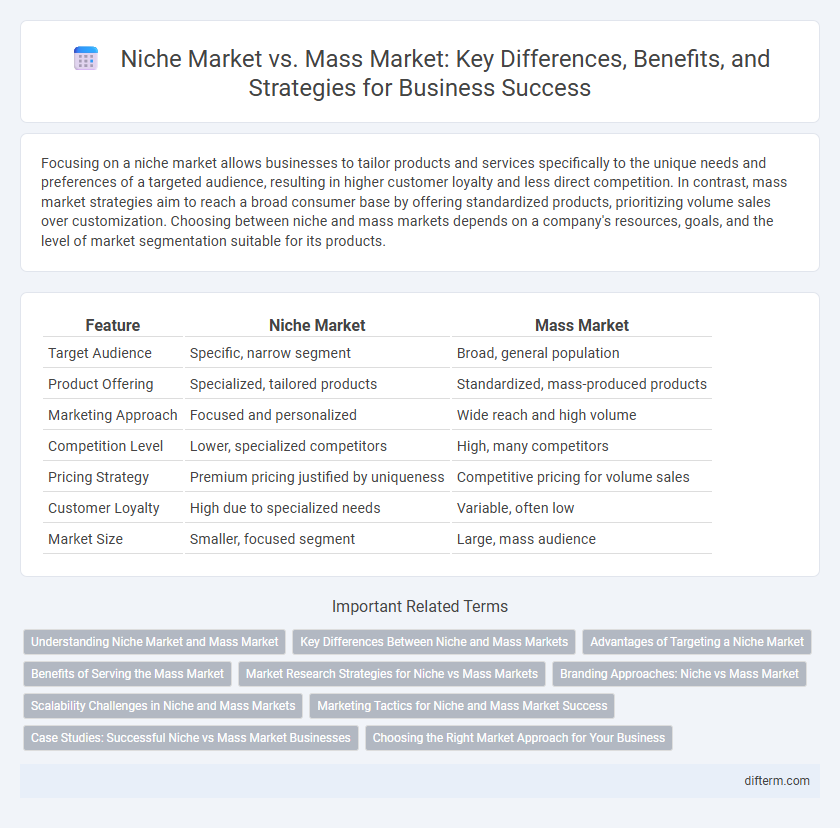Focusing on a niche market allows businesses to tailor products and services specifically to the unique needs and preferences of a targeted audience, resulting in higher customer loyalty and less direct competition. In contrast, mass market strategies aim to reach a broad consumer base by offering standardized products, prioritizing volume sales over customization. Choosing between niche and mass markets depends on a company's resources, goals, and the level of market segmentation suitable for its products.
Table of Comparison
| Feature | Niche Market | Mass Market |
|---|---|---|
| Target Audience | Specific, narrow segment | Broad, general population |
| Product Offering | Specialized, tailored products | Standardized, mass-produced products |
| Marketing Approach | Focused and personalized | Wide reach and high volume |
| Competition Level | Lower, specialized competitors | High, many competitors |
| Pricing Strategy | Premium pricing justified by uniqueness | Competitive pricing for volume sales |
| Customer Loyalty | High due to specialized needs | Variable, often low |
| Market Size | Smaller, focused segment | Large, mass audience |
Understanding Niche Market and Mass Market
Understanding niche markets involves targeting a specific, well-defined segment with tailored products or services that meet unique customer needs, resulting in higher customer loyalty and less competition. Mass markets focus on broad demographics, aiming to reach a large audience with standardized offerings, leveraging economies of scale to maximize sales volume. Businesses must analyze consumer behavior, market size, and competition intensity to determine if a niche or mass market strategy aligns best with their growth objectives.
Key Differences Between Niche and Mass Markets
Niche markets target specific, well-defined customer segments with specialized products or services, emphasizing customization and customer loyalty. Mass markets focus on broad customer bases with standardized products aimed at maximizing reach and volume sales. Key differences include market size, product differentiation, marketing strategies, and customer engagement levels.
Advantages of Targeting a Niche Market
Targeting a niche market allows businesses to specialize in meeting specific customer needs, leading to higher customer loyalty and less competition compared to mass markets. Companies can achieve more effective marketing by tailoring messages to a well-defined audience, resulting in improved conversion rates and higher return on investment. Focused product development in niche markets also enables faster innovation and the ability to command premium pricing due to specialized value.
Benefits of Serving the Mass Market
Serving the mass market allows businesses to achieve economies of scale, resulting in lower production costs and higher profit margins. Access to a broader customer base increases brand visibility and drives significant revenue growth. Mass marketing strategies enable companies to leverage widespread consumer demand and maximize market penetration.
Market Research Strategies for Niche vs Mass Markets
Market research strategies for niche markets emphasize deep customer insights, targeting specific demographics with tailored surveys and qualitative methods such as focus groups to understand unique needs and preferences. For mass markets, research relies on large-scale quantitative data, employing broad surveys, analytics, and trend analysis to capture diverse consumer behavior and optimize mass appeal. Utilizing segmentation analysis and competitor benchmarking helps refine approaches in both niche and mass market contexts.
Branding Approaches: Niche vs Mass Market
Branding in a niche market emphasizes specialized messaging tailored to a specific audience, enhancing brand loyalty and differentiation through personalized value propositions. In contrast, mass market branding relies on broad, universal appeal with consistent, high-visibility campaigns designed to maximize reach and brand recognition. Companies targeting niche markets leverage detailed customer insights to create intimate brand experiences, whereas mass market brands focus on scalability and widespread consumer engagement.
Scalability Challenges in Niche and Mass Markets
Niche markets face scalability challenges due to limited customer bases, making rapid growth difficult without diluting brand specificity. Mass markets offer broader customer reach but require substantial resources and infrastructure to scale effectively while maintaining quality and customer satisfaction. Businesses must balance targeted product development in niche markets against the operational demands of scaling mass-market offerings to optimize growth potential.
Marketing Tactics for Niche and Mass Market Success
Marketing tactics for niche markets emphasize personalized messaging, targeted social media campaigns, and cultivating strong customer relationships to build brand loyalty within a specific audience. In contrast, mass market strategies prioritize broad-reaching advertising, competitive pricing, and widespread distribution channels to maximize exposure and sales volume. Understanding customer segmentation and adapting marketing mix elements are crucial for achieving success in both niche and mass market environments.
Case Studies: Successful Niche vs Mass Market Businesses
Case studies reveal that niche market businesses like Tesla initially focused on electric vehicles for environmentally conscious consumers, enabling rapid brand loyalty and premium pricing, while mass market companies like Toyota achieved scale through affordable, reliable cars targeting broad audiences. Tesla's targeted innovation and exclusivity contrast with Toyota's high-volume production and widespread distribution strategies. These examples demonstrate how niche markets capitalize on specialized consumer needs, whereas mass markets thrive on broad accessibility and economies of scale.
Choosing the Right Market Approach for Your Business
Choosing the right market approach hinges on understanding your product's unique value and target audience. Niche markets offer specialized customer bases with less competition and higher loyalty, while mass markets provide broader reach and larger volume sales. Businesses must analyze market demand, competition intensity, and resource capacity to determine whether a focused or expansive strategy aligns best with their growth objectives.
Niche Market vs Mass Market Infographic

 difterm.com
difterm.com